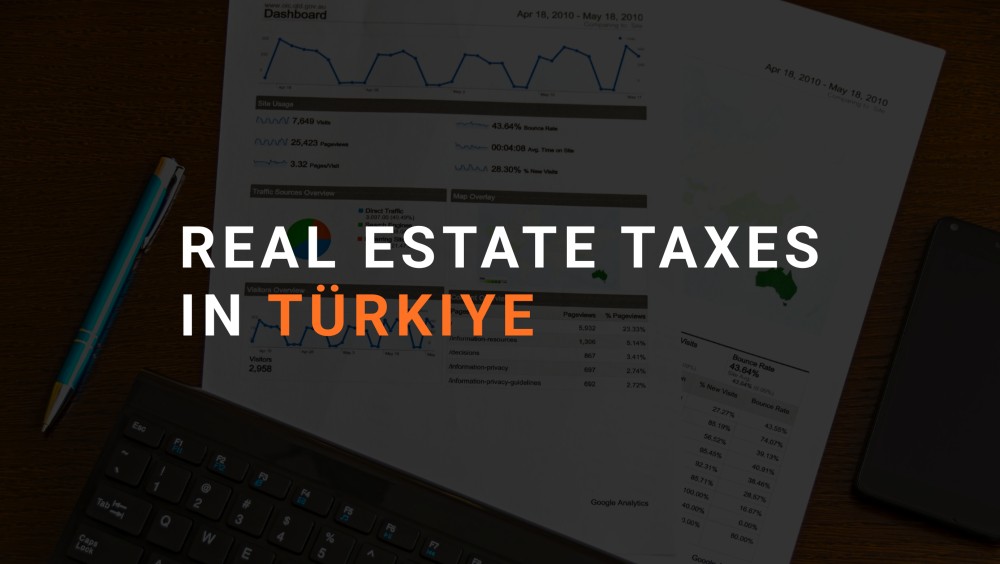Taxes on the purchase, sale and rental of real estate in Turkey in 2024


In Turkey, a country with a unique combination of oriental exoticism and European infrastructure, the acquisition of residential real estate is open to foreigners. The laws of this state provide equal conditions in the field of taxation for foreign investors and local residents.
The tax climate in Turkey is characterized as very favorable, which attracts foreign investors interested in purchasing liquid apartments on the Mediterranean coast. At the same time, the owners undertake to pay both one-time and annual taxes.
What are the taxes for non-residents when purchasing real estate in Turkey? What factors influence the amount of payments, and what consequences may occur for evading payment of contributions on real estate purchased in Turkey? The answers to these questions are in our new publication.
Increase in property taxes in Turkey
Effective July 10, 2023, Turkey introduced new property tax rates covering both Turkish nationals and foreigners. It is noted that for property transactions conducted in foreign currency, these changes have minimal impact due to exchange rate differences. But what specific adjustments were made?
The value added tax rate increased from 18% to 20%, and for certain categories of goods rose from 8% to 10%.
In addition, a 2% increase in the tax on ownership transfer was announced. This means that if earlier, when registering a Tapu certificate, the investor paid 4% of the cadastral price, now this share is 6%.
For example, if the cadastral value of the property is ₤ 1,000,000, then the tax will be 2,068 € versus 2,000 € that would have been paid previously. This slight difference is due to the strengthening of the euro in recent months.
The authorities also decided to increase by 50 percent government fees, fees for notary services, court fees, consular and cadastral services, as well as for registration of residence permits through investments, work permits and other transactions.
For example, this year the price of TAPU registration jumped from 20,000 to 30,000 ₤, and the cost of expert real estate assessment increased to 60,000 ₤.
All listed payments for the purchase of real estate in Turkey are borne by the buyer.
What determines property tax in Turkey?
The annual property tax in Turkey is a mandatory fee for all property owners.
The tax amount depends on:
- location (metropolitan municipalities, small towns);
- type of object - housing, commercial property, land;
- cadastral value, that is, the amount indicated in the TAPU.
Tax on the sale of real estate in Turkey
In Turkey, Gelir vergisi is an income tax required by both individual and corporate entities, and its amount is correlated with the amount of capital gains. All types of income are subject to taxation, including wages, rental housing and business, and real estate transactions.
When calculating, a differentiated tax rate is applied, which increases with the growth of profits.
Turkish law provides for an exemption from filing a tax return and paying income tax when selling an apartment in Turkey if the ownership period exceeds five years. In case the property is sold by a foreign owner who acquired it less than five years ago, the contribution is calculated only on the profit from the sale (i.e. capital gain), less the cost of registration of title (TAPU), as well as other associated costs and repair work.
Important! The term “capital gain” is used when we are talking about the difference between the price of the property declared in the seller’s TAPU and its assessed value recorded in the buyer’s new title.
Since the beginning of 2023, the Turkish government has increased the minimum threshold at which income tax is calculated, thereby reducing the tax burden for payers.
Individuals must pay income tax in case of resale of housing if income exceeds ₤55,000 ($1,867). The tax rate is determined by the following conditions:
| Profit margin in Turkish lira | Profit in US dollars equivalent | Tax rate |
|---|---|---|
| up to 70,000 ₤ | up to $3,720 | 15% |
| from 70,000 ₤ to 150,000 ₤ | $3,720–$7,972 | 20% |
| from 150,000 ₤ to 550,000 ₤ | $7,972–$29,231 | 27% |
| from 550,000 ₤ to 1,900,000 ₤ | $29,231–$100,983 | 35% |
| more than 1,900,000 ₤ | more than $100,983 | 40% |
Income tax on the sale of an apartment in Turkey is calculated as follows: if the amount of profit is ₤ 150,000, then up to ₤ 70,000 the tax is 15%, that is, ₤ 10,500. On the remaining amount of income (everything above 70,000 ₤) there is a tax of 20%. If the profit is up to ₤550,000, then 20% income tax (₤26,500) is charged on the amount of ₤150,000, and 27% on the remaining amount. The scale of government contributions for the sale of real estate is calculated using the same principle.
As for legal entities, they pay a fixed income tax when selling real estate in Turkey, which is 20% of income and does not depend on the period of ownership of the property.
We will separately highlight the so-called tax on property inheritance or gift transfer - Veraset ve İntikal Vergisi. The contribution is paid by individuals. The amount is determined by the cadastral price of the property and the degree of relationship of the heirs.
Inheritance tax rates range from 1 to 10%; in the case of gifts, from 10 to 30%.
Just like when calculating income tax, the contribution percentage is not applied to the entire amount, but is divided into intervals. A certain tax is charged separately on them:
| Cadastral value of housing | Inheritance tax | Gift tax |
|---|---|---|
| up to ₤1,100,000 | 1% | 10% |
| above 2,600,000 ₤ | 3% | 15% |
| above ₤5,500,000 | 5% | 20% |
| more than 10,900,000 ₤ | 7% | 25% |
| more than 20,100,000 ₤ | 10% | 30% |
Taxes when purchasing real estate in Turkey
Turkey's Property Purchase Tax (Tapu Devir Vergisi) is a fee paid at the time of registration of ownership.
This payment, as a general rule, is made by the buyer during the re-registration of TAPU, despite the fact that the law provides for an equal distribution of this financial burden between both parties to the transaction. The fee is set at 4%.
The state apartment tax in Turkey is paid on the amount indicated in the TAPU, that is, the cadastral price. So, if the cost of the apartment is $200,000, then the investor needs to spend $208,000 along with paying the state fee.
Property registration tax in Turkey for foreigners is paid before the sales contract is registered. This can be done at an accredited Turkish bank or through the Tax Office. In addition, cash payments are provided.
In addition to the tax on the purchase of an apartment, VAT is paid in Turkey if the housing is located in a new building. Value added tax rates vary from 1 to 18%, which is determined by the area and type of object. Detailed information on VAT rates can be obtained from representatives of the developer or realtor.
Note! As part of efforts to attract foreign capital, the government in 2017 abolished VAT for foreign investors purchasing apartments on the primary housing market. Foreigners who have signed a sales contract and stay in the state for less than 183 days in a fiscal year are allowed to apply for a tax refund. Often the tax refund is 1–15% of the price fixed in the contract.
Property ownership tax in Turkey
Emlak Vergisi, or property ownership tax in Turkey, is an annual mandatory payment for owners to maintain their property.
The annual property tax in Turkey is levied by the municipal authorities. Moreover, its amount varies, based on the location of the object, purpose (residential complex, commercial real estate or land) and the cadastral value registered in the Turkish title (TAPU). Detailed information on the procedure for calculating this tax is given in Articles 8 and 18 of the Tax Code for Real Estate.
Let's look at how the tax rate is determined and on what it depends:
| PROPERTY TYPE | TAX RATE FOR LARGE PROVINCES/CITIES | TAX RATE FOR REMAINING PROVINCES |
|---|---|---|
| Housing | 0.2% | 0.1% |
| Commercial real estate | 0.4% | 0.2% |
| Land plot without permission for construction work | 0.2% | 0.1% |
| Plot of land with permission to carry out construction work (arsa) | 0.6% | 0.3% |
Large cities in Turkey, where annual tax is charged at a higher rate, are: Antalya, Istanbul, Konya, Mersin, Bursa, Izmir, Adana, Ankara, Kocaeli, Mugla and others.
In cases where the acquired building is officially part of the cultural heritage of the Turkish Republic, the tax rate rises to 10%.
In addition, if a building does not have a technical passport, then it is classified as a “construction site” type. Immediately after receiving the technical passport, the type of object is adjusted in accordance with the classification in the table. At the same time, its cadastral price increases. After a certain period of time, municipal authorities make adjustments to the cadastral value of real estate, which affects the amount of the annual contribution.
Calculation example:
Apartments in Istanbul cost, according to the cadastral price indicated in TAPU, $250,000 (calculated in Turkish lira).
The tax rate applied to this type of real estate is 0.2%.
Annual tax is $500.
Taxes on renting out real estate in Turkey
Emlak Kira Geliri Vergisi, or apartment rental tax in Turkey, is a government tax contribution paid by homeowners according to a graduated scale.
As stated in Article 21 of the Income Tax Law, owners are now exempt from paying a contribution on rental income if their annual income does not exceed 21,000 ₤ (about 715 $) for apartments and 35,000 ₤ (about 1,190 $ ) for commercial areas.
Let us recall that in 2017 a decree was issued that short-term rentals are permitted only to legal entities that have the appropriate license. However, long-term rent (for a period of one year or more) is available to private owners, subject to the execution of a notarized lease agreement and registration of tenants with the local Civil Status Office. The best option for non-residents who want to rent out their property and earn income is a guaranteed rental through a real estate agency.
Tax rates on rental income for individuals:
| Profit in Turkish lira | Profit in US dollars | Tax |
|---|---|---|
| up to 70,000 ₤ | up to $2,380 | 15% |
| 70,000–150,000 ₤ | $2,380–$5,102 | 20% |
| 150,000–550,000 ₤ | $5,102–$18,708 | 27% |
| 550,000–1,900,000 ₤ | $18,708–$64,628 | 35% |
| more than 1,900,000 ₤ | over $64,628 | 40% |
Calculation example:
Apartment 1+1 in Alanya with a total area of 70 m2, rental price $1,000 (about ₤ 29,400) per month.
Annual rental profit is $12,000 (about ₤353,000).
The income amount of ₤150,000 is taxed at 20% - ₤10,500, and the balance (₤203,000) is taxed at 27% - ₤54,810.
The progressive tax does not apply to legal entities that own real estate and rent it out. They have a fixed tax of 20%.
How to pay property tax in Turkey
To pay real estate tax, you will need an individual taxpayer number (TIN) issued in Turkey.
The fastest and easiest way is to pay online on the official website of the Tax Service. The portal allows you to make any government contributions, in addition to the municipal annual property tax in Turkey. You can also view accrued taxes on the website by entering your Taxpayer Identification Number (TIN).
Payment of the annual apartment tax in Turkey is carried out online on the web portal of the municipality at the location of the property. Having a TIN is required.
Taxes are paid twice a year - in May and November, or in one payment. However, certain provinces have their own due dates for certain tax contributions.
Taxes on luxury real estate in Turkey
In Turkey, the so-called annual premium apartment tax, or Değerli Emlak Vergisi, is additionally charged if the price tag exceeds 9,967,000 ₤ (about $338,456).
The tax on luxury real estate is charged on a progressive scale:
| REAL ESTATE COST | TAX RATE |
|---|---|
| 9,967,000–14,951,000 ₤ ($338,456–$507,701) | 0.3% |
| ₤14,951,000–19,936,000 ($507,701–$676,980) | Two parts are paid: a fixed amount of ₤ 14,951+0.6% of the cadastral value exceeding ₤ 14,951,000 |
| more than ₤19,936,000 ($676,980) | Two parts are paid: a fixed amount of ₤ 44,862+1% of the cadastral value exceeding ₤ 19,936,000 |
What happens if you don't pay taxes?
Taxes in Turkey are provided for the purchase of each subsequent apartment. There are situations when owners try to find ways to evade paying government fees or do it at the wrong time. In both cases, Turkish legislation provides for certain consequences in the form of penalties and legal liability.
In particular, if a foreigner does not pay the annual property tax in Turkey, then for each month of delay a penalty of 1.4% of the contribution amount will be charged.
You can clarify the amount of tax payment and the accrued fine in the city municipality at the location of your property. If you do not have the opportunity to go to the administration and get the necessary information, use the official website of the municipality.
If a foreign home owner in Turkey ignores paying taxes for a long time, then the debt case is sent to court.
In what cases do you not need to pay taxes in Turkey?
To begin with, foreign investors are protected from double taxation of profits in Turkey. That is, if a non-resident pays income tax in his home country, he does not need to pay a similar one in Turkey. Agreements on the avoidance of double taxation were concluded by Turkey with a number of countries, including the Russian Federation, Ukraine, Belarus and other countries of the former CIS, as well as the USA, Israel, the Czech Republic, etc.
Further, as we have already mentioned, individuals are exempt from taxation if their income from rental housing does not exceed ₤70,000 per year.
You can sell an apartment in Turkey without paying income tax if you have owned the property for more than five years or if the profit from the sale does not exceed ₤55,000.
In Turkey, pensioners, the unemployed, housewives without an additional source of funding, widows, veterans, disabled people and other special categories of citizens are exempt from the annual tax on real estate ownership.
Taxes when purchasing property in Turkey remain acceptable for most non-residents, which contributes to the growing popularity of resort apartments among foreign buyers. At the licensed real estate company Altop Real Estate, we guarantee comprehensive support in the selection and registration of ownership of investment-attractive apartments in Turkey, ensuring a legal transaction without risks and overpayments.



